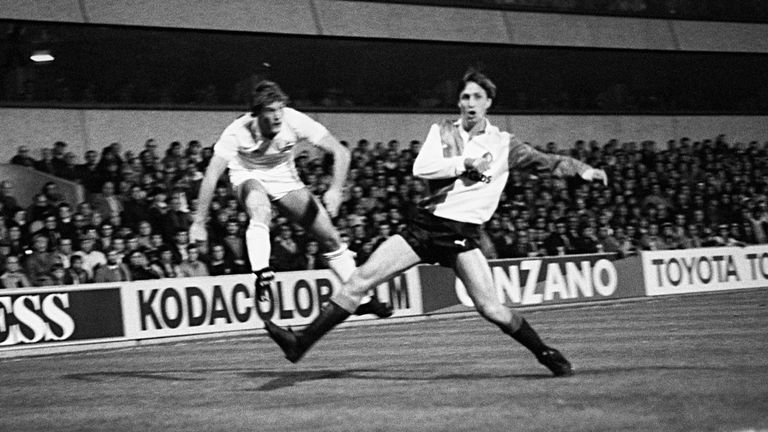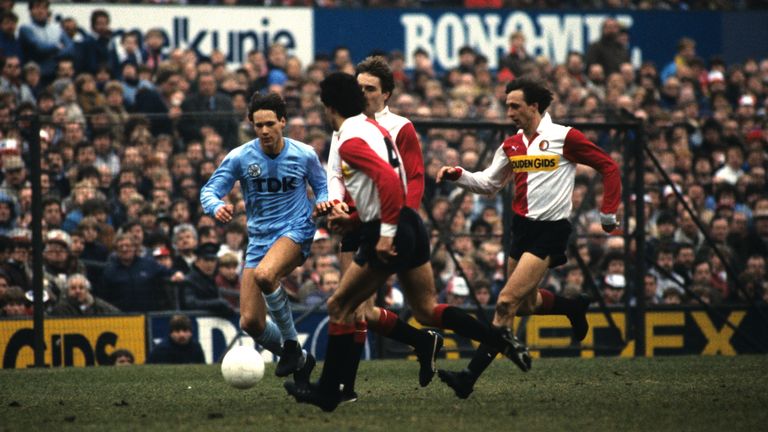His Feyenoord team-mate Sjaak Troost once likened it to him cheating in the presence of his wife. Not just cheating on her, in fact, but insisting on maintain eye contact throughout.
Imagine the shock. This was Johan Cruyff. The legend himself. The man who had inspired Ajax to three consecutive European Cup triumphs in the previous decade before returning from his adventures in Barcelona and beyond to win two more Eredivisie titles for the club.
“Johan was Mister Ajax,” Troost tells Sky Sports.
And now, at the age of 36, he was leaving them for arch-rivals Feyenoord.
What followed remains one of the most compelling stories in the history of Dutch football. A story centred on its most singular individual. Arguably, the game’s most important figure.
That season at Feyenoord, his last as a player, provided the perfect punctuation mark to his career. It was not Cruyff at his peak, the version that had won a trio of Ballons d’Or, the star turn at the 1974 World Cup. But perhaps it revealed even more about what made him great.
Cruyff did it his own way.
And if you disagreed, he would prove you wrong.
He had returned to Ajax in 1981 and swiftly wrestled back the Eredivisie title that had been surrendered to AZ Alkmaar. Soon, he became the figurehead for a vibrant Ajax team that was bolstered by the breakthrough performances of a teenage Marco van Basten.
“At that time, he was coming back as the big star,” Van Basten tells Sky Sports. “I had grown up watching the great teams of Ajax and the national team. It was a great stimulus for me.
“I was very proud and very happy that we knew each other so well. After I had become part of the team at Ajax, we became friends and he even became my advisor. It was very special.
“And then he went to Feyenoord and became my opponent.”
In the summer of 1983, Cruyff found himself at odds with the Ajax board. A glorious playing career was coming to an end but – as was often the case – he was already the de facto coach. Cruyff never just took part, he took over. Seeds were being sown for him to stay on.
And yet, after two successful seasons, the decision was made not to renew his contract. Those higher up were happy to allow him to leave. The deal to keep him was viewed as too expensive given his advancing years. At 36, what harm could letting him go really do?
At first, Cruyff was shocked. This was his club and since the death of his father, it had felt even more like home. It is said that even until the day of signing the contract – June 15 1983 – he was anticipating that the decision would be reversed. It was not.
Now he was angry and revenge was on his mind.
“He came to Feyenoord because Ajax did not listen to him,” says Troost.
For one of the game’s great minds, that was inexcusable.
If there was unease about the transfer in Amsterdam, over in Rotterdam the feeling was mutual. This was a man who had come to define Ajax. And he wasn’t going to come quietly.
“Some players had trouble with it in the beginning,” admits Troost.
He himself was not among them. Despite later being part the squad that won Euro ’88, Troost is magnanimous enough to state that even that side did not compare to Cruyff’s.
“In my opinion, the best Dutch national team in our history is still the national team in 1974,” he says. “So, for me, it was not an issue because I still think he is the best player there has ever been. To be allowed to play football with him was indescribable.”
It was clear from day one that Cruyff was serious about the challenge.
Nobody really knew what to expect before the first training session. But during the initial medical examinations, the veteran turned out to be among the fittest in the squad.
He had spent his vacation playing tennis every day. During pre-season training, he would lead the early morning six-kilometre run through the forest, a picture of concentration.
“It was unbelievable,” says Troost, “not an ounce of fat and just focused on winning. Of course, I saw that it took him a lot of effort but what do you want at the age of 36?”
“So much respect. Wow.
“Soon, everyone was very happy with him and he was admired by all.”
He was a man on a mission.
To play for Feyenoord. To play against Ajax.
Even so, there were problems on the pitch early on, not least because of the ideas that he had imparted on a young Ajax side that now included Ronald Koeman as well as Van Basten.
It would take time for Feyenoord to embrace these patterns – something that became clear when the first Klassieker came around in the middle of September. A beating beckoned.
Ajax won 8-2 in Amsterdam.
“We were quickly down 3-0 but when we came back to 3-2 everyone was waiting for the 3-3,” remembers Troost.
“When it became 4-2 it was over.”
The game had been in the balance for an hour, Feyenoord had even been dominant, but the result spoke for itself and the Ajax directors were the ones smugly celebrating. Van Basten had scored a hat-trick. Ajax had shown they had moved on. This was humiliation for Cruyff.
Not that he saw it that way.
“Johan told me that whether you lose 1-0 or 8-2, the points remain the same.”
In hindsight, with the game between the teams coming so early in the season, Ajax were benefiting from the legacy left behind. Feyenoord were still learning the ways of Cruyff.
“If you saw Johan play football you were already impressed but when you played with him it was unbelievable,” says Troost. “In the beginning, it was certainly difficult for many players to get Johan because he does not think one or two steps ahead but three or four.”
That is how Van Basten remembers it too.
“With the years, when you get a little bit more intelligent, the game becomes a little bit easier physically because you are resolving a lot of things in your mind,” he explains.
“The way that he was playing in his last years was wonderful to watch and very interesting. I played with him and against him, I trained with him. Even then, he made it look so easy.”
Ajax might have had Van Basten but Feyenoord had quality young players of their own. Ruud Gullit was emerging as one of the country’s most promising talents. Soon, he was forming a formidable partnership with Cruyff on the pitch. Feyenoord went 14 unbeaten.
By the time of the return meeting in Rotterdam in February, the balance of power had already shifted. Feyenoord had knocked Ajax out of the cup after a replay. But the killing stroke came in front of 58,000 fans at De Kuip as the champions were put to the sword.
Gullit opened the scoring early on, Cruyff himself added a second within minutes. When it was all over, Feyenoord had won 4-1 and those Ajax directors were celebrating no more.
As Cruyff saw it, Ajax still had good players but Feyenoord had the greater team ethic now. Their movements were coordinated, while their opponents were playing as individuals. “The patterns are over,” he said of his old team. “The discipline is gone.” They lacked a leader.
Cruyff had proven his point.
For Troost, who would spend the rest of his career at Feyenoord a one-club man, before taking on the role of commercial director, that season will always hold magical memories.
“It was my first championship so it was very special,” he says, “but for the people this championship remains very special because of Johan Cruyff and the young Ruud Gullit.”
The only regret is that it did not last longer.
“I learned a lot from Johan and I would certainly have wanted to play football with these men for another year because then my own football career would have turned out differently and I would probably have played more international matches too.”
There was a point during the season that Cruyff remarked that Feyenoord no longer needed him. He had reshaped things and set them on a new path. With the team flying and on their way to a first title in a decade, it was a charming observation.
In this instance, he was wrong.
“I already missed him after the first game of the new season,” says Troost.
Without him, Ajax duly regained the title and it would be almost another full decade before Feyenoord’s next Eredivisie success. Long before then, Cruyff had made his peace with his old club, guiding Ajax to more European glory in 1987. Forgiven but not forgotten.
His legend only enhanced by his season of revenge.








